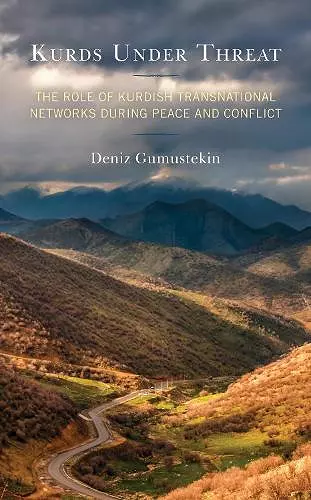Kurds Under Threat
The Role of Kurdish Transnational Networks During Peace and Conflict
Format:Hardback
Publisher:Bloomsbury Publishing PLC
Published:30th Aug '21
Currently unavailable, and unfortunately no date known when it will be back

Previous researches examine how transnational ethnic ties impact the relationship between host states and diaspora and why states and ethnic minorities in the diaspora may occasionally support violent rebel organizations in the homeland. However, these previous studies do not really consider the relationships among co-ethnic organizations without a homeland government. This book tackles the following important questions: How and when do co-ethnic Kurdish organizations provide open support for each other during conflict-peace cycle events? Moreover, do external threats impact the relationship among co-ethnic organizations? The aim of this research is to identify the causal factors that influence the transnational networks between Kurdish organizations. Research findings reveal that political rationality and external threats seem to be stronger predictors of political behavior than ethnic ties in the Kurdish case. This study helps scholars and policy makers to evaluate the impact of transnational networks between co-ethnic Kurdish organizations in cases of civil war, which may play a crucial role in the escalation and de-escalation of international conflicts. In addition, this research helps to understand the role of co-ethnic organizations in building sustainable peace in areas of conflict.
Kurds Under Threat presents a fascinating analysis of intra-ethnic conflict and cooperation among Kurdish political organizations. Gumustektin offers deep insights into the internal politics of the Kurdish nationalist movement across Turkey, Iran, Iraq, and Syria through a mixture of qualitative and quantitative data. This book is highly recommended for anyone interested in Middle Eastern politics, ethnic conflict, and civil war. -- Idean Salehyan, University of North Texas
Scholarly works on the Kurds have been widely expanding in the last two decades or so since the Kurdish Middle East has become one of the most turbulent centers of regional geopolitics. Yet, less attention has been given to the dynamics of co-ethnic Kurdish relations across Iraq, Turkey, Iran and Syria. Thus, this book is a welcome contribution for understanding when and why different Kurdish political and rebel organizations adopt supportive or critical discourses toward each other. The book’s empirically sound analysis of co-ethnic Kurdish relations would be a great interest for the scholars in the field. -- Serhun Al, Izmir University of Economics
ISBN: 9781793643339
Dimensions: 229mm x 160mm x 17mm
Weight: 481g
178 pages